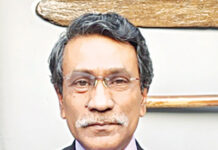“Sacrifice” does not mean the rejection of the worthless, but of the precious. “Sacrifice” does not mean the rejection of the evil for the sake of the good, but of the good for the sake of the evil. “Sacrifice” is the surrender of that which you value in favor of that which you don’t.
The virtue of selfishness, Ayn Rand
It is ironic that, our present day political leaders claim LOVE for their nation. In love there is sacrifice. After our independence, our two great leaders sacrificed their lives. One would argue, because of his immense love, the founding father of Bangladesh Sheikh Mujibur Rahman wanted to consolidate power through the creation of one party to prevent chaos. While the others would say Ziaur Rahman saved the nation from utter disarray. Eighteen conspiracies had to be subdued until his life was taken by the conspirators. Both men were sacrificed for their beloved nation and both should be respected.
Now can we fast forward and go on please? Do we need to create revisionist history by indoctrinating the youngsters through text books and other means about the misgivings during the growth period of Bangladesh? Do we have to keep reminding about 1971 and 1975 and can we not go forward? Both of the founding leaders had great flaws but both had their hands full at the time. Mistakes were made. Now it is time to move forward instead of making comparisons and denying one another.
Our neighbors are taking full advantage of these squabbles and making their own plans how to keep us in this state of mind till our nation is totally fractured to clear a pathway to their advantage. If we love our country, all parties should take an oath not to destroy what has been created. Created by the hard work of the quiet citizens who have no time to block the roads and come down with “Loggi and Boitha” to create panic in the streets.
Both leaders claim they love their nation. If they do, why can’t they talk about the common interest of the people and discuss matters of mutual benefit? Why do they openly encourage flouting of the law, looting and plundering the exchequer, human rights violations that is pushing the country deeper and deeper into the moral abyss that we are all in now?
Thanks to the current Awami League government’s known and unknown concessions that it has given to India, Bangladesh can hardly be called independent anymore. India’s policy is to control our economy, politics and military to fulfill its strategic interest in the region. Do not look any further then Nepal, Bhutan, Tibetan territories, Sikkim and other regions. India desperately needs that corridor to connect their new lands. They will roll over you if you do not allow them to do so.
That does not mean we have to rise up in arms against the Indians. We have to create an aura of independence in our decision making and a bipartisan method of making long term decisions that affect our strategic and economic interests. Our national goals should be the priority and both parties have to talk in private and public when it comes to the national interests.
The biggest threat is not climate change…biggest threat is violence and instability. Political mistrust and the threat of confrontation run deep. The country cannot afford to return to the politics of deep-seated division and violence of the past. Sustainable democracy and prosperity are essential for Bangladesh to achieve middle income status by the next decade.
Corruption and misuse of funds remain a major threat and strongly impede the country’s social and economic development. The issue of corruption is a significant problem here and it needs to be addressed by all parties who claim their love for Shonar bangla.
To achieve security and prosperity, Bangladesh needs to have strong independent institutions and a functioning parliament at the center of political debate. Given the worrying deterioration of the political situation in Bangladesh, with the repression of the political opposition, including arrests and disappearances of opposition leaders, we have to tread carefully in the view of the approaching elections in 2014.
Bangladesh faces the strong risk of repeating the antagonistic climate that surrounded the chaotic 2007 elections which brought the country to the brink of outright army intervention. The civic society and related organizations must take action on democratization, respect of human rights and organization of fair elections.
Elections have historically been a time of heightened violence and insecurity in Bangladesh and there is a significant risk of clashes during the planned parliamentary elections in 2014. Violence surrounding the elections in 2006 (which never took place) resulted in extensive property damage, injuries and 20 deaths. The 2008 election witnessed a significant reduction in violence and was declared as free and fair by the international community, as it was overseen by a civilian Caretaker Government (CTG). However, the ruling Awami League (AL) party recently abolished the CTG, sparking a rise in inter-party violence between supporters of the AL and the main opposition Bangladesh Nationalist Party (BNP), who calls for the restoration of the CTG. The BNP threaten to boycott the planned election if this does not take place. The country desperately needs a non-partisan election commission agreed to by the major parties. It is not an impossible task if both the begums love their Shonar Bangla.
The Bangladesh Chroncile









